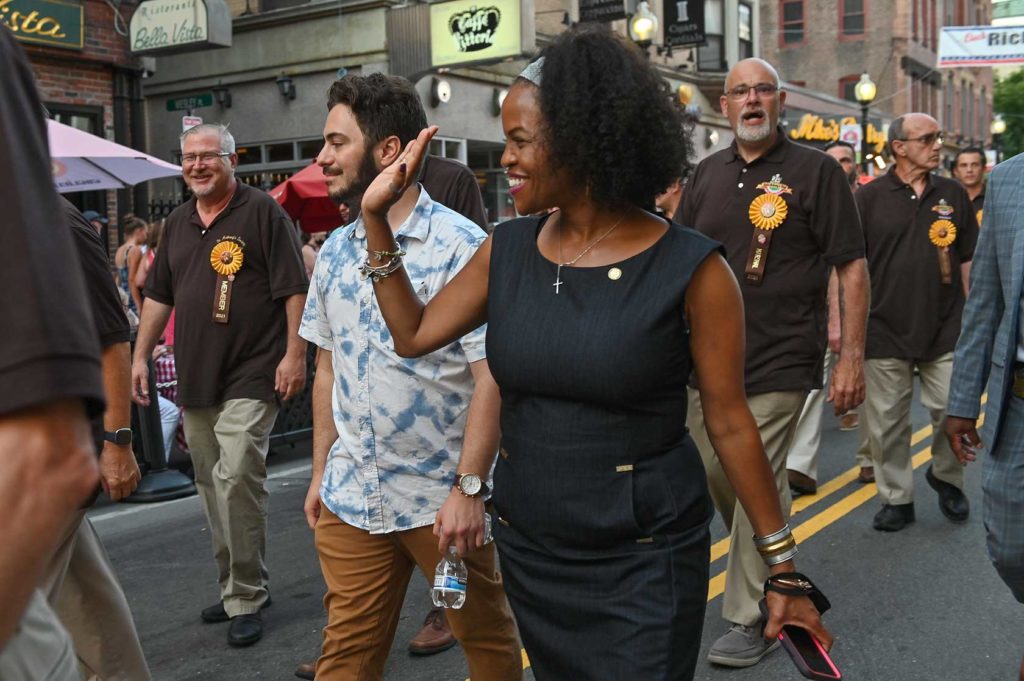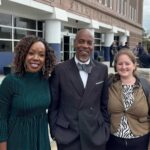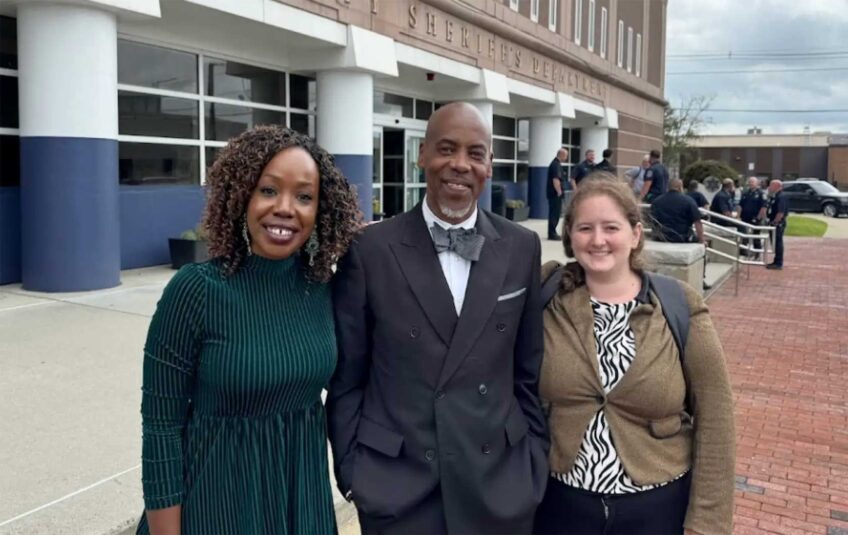Voters split on mayoral candidates
Latest poll shows Wu in lead, others nearly tied

With less than two weeks until the Sept. 14 preliminary in the mayoral election, at-large City Councilor Michelle Wu appears most likely to advance to the final election with councilors Annissa Essaibi George, Andrea Campbell and acting Mayor Kim Janey locked in a tight competition for the number two spot.

District 4 Councilor Andrea Campbell speaks in front of the Edward Brooke Courthouse
Monday. COURTESY PHOTO
An Aug. 26 Emerson College Poll showed undecided voters still the majority with 25% of respondents unsure for whom they will cast a ballot in the preliminary and Wu close behind with 24% of voters leaning toward voting for her. The next three candidates were nearly in a statistical dead heat with 18% indicating support for Essaibi George, 16% for Janey and 14% for Campbell. John Barros, who served as chief of economic development in the administration of former mayor Martin Walsh polled at 2%. Emerson polling pegged its margin of error at 3.9%.
Black voters are split, with 31% leaning toward Janey and 24% for Campbell, Latino voters are nearly evenly split between Wu, Janey and Essaibi George and white voters are split between Essaibi George and Wu. Those splits will likely re-arrange after the preliminary narrows the field down to two, notes former City Councilor Tito Jackson. Attracting voters of color will be the key to victory, he said.
“The Black vote is going to be very important in this race,” Jackson said. ‘We can see from past races that as the Black, Latino and Asian vote goes, a win follows.”
But the winning campaign will have to do a lot to attract voters.
“There’s still a lot of people who have yet to make up their mind,” said Jackson, who is supporting Janey.

Jorge Arce (left) and José Massó of ¡Con Salsa!, sing during an event with members of the Latino community to show support for City Councilor Michelle Wu’s mayoral campaign at the Puerto Rican Veterans Memorial in the South End Monday. PHOTO: ANGELA ROWLINGS
A busy start to the week
Monday, campaigns were in full swing. At the Puerto Rican Veterans monument in the South End, Wu met with members of Boston’s Latino community to highlight endorsements from activists such as Jose Masso, Tony Molina and Jaime Rodrigues.
We have a rich pool of candidates in Andrea, Kim, John and Michelle,” Masso said. “What distinguishes Michelle is her platforms and policy.”
Masso singled out Wu’s policy prescriptions for combatting climate change as a decisive factor in his support.
Janey, meanwhile, swore in a class of 13 emergency medical technicians at Faneuil Hall. As acting mayor, the District 7 councilor has enjoyed a higher profile than her opponents with daily media appearances that come with the office that enable her to campaign without campaigning.
“Congratulations to our newest class of EMTs,” Janey intoned in the cavernous 18th century hall. “Thank you for your service on behalf of the entire City of Boston, during the pandemic and beyond.”
As Janey conducted official business, two of her opponents pledged their willingness too tackle issues that have long gnawed at the city’s residents: housing and crime.
In front of the Edward Brooke Courthouse, Andrea Campbell called on Janey to use her mayoral powers to enact a citywide moratorium on evictions.
“Housing stability is essential to keep Bostonians safe and healthy, especially amidst this deadly pandemic,” she said. “As the deadlier delta variant spreads, it must be our top priority to keep people in their homes and we cannot wait.”

City Councilor and mayoral candidate Annissa Essaibi George greets people along Bowdoin Street in Dorchester as part of her “Tough Conversations Tour.” PHOTO: ANGELA ROWLINGS
At noon, Essaibi George walked along Bowdoin Street, an obligatory stop for candidates burnishing their tough-on-crime image. Although shootings, murders and other major categories of crime are continuing a years-long downward trend in 2021, crime remains a top issue for many voters, with 13% indicating concern in the Emerson poll.
“There are issues in our city that are far too often ignored, under-resourced, or are just plain poorly managed that we need to come to terms with and address,” said Essaibi George in a press statement. The answers aren’t always necessarily simple, but that doesn’t mean we look the other way.”
While housing, education and crime may play a major role in this year’s race, some political activists say race is still an important theme. White voters appear split between Essaibi George and Wu, with little support for Campbell and Janey. On the other hand, Esssaibi George and Wu have support from just 9.4% of Black voters.
Political organizer Anthony Collins says he doesn’t think the vote will split purely on race lines or candidates’ stands or actual records on issues. Instead cites what other political organizers are referring to as “vibes.”
“A lot of people will vote based on who vibes the most on progressive values or who vibes the most on conservative issues,” he said.
With voter support moving in so many different directions and a large number of undecideds, Jackson points to the power of the campaigns canvas infrequent voters and turn out those who are most likely to support their candidate.
“This race shows there are a lot of people who are yet to make up their minds,” he said. “It’s going to come down to who has the best field game. This is going to be based on excitement and execution.”







